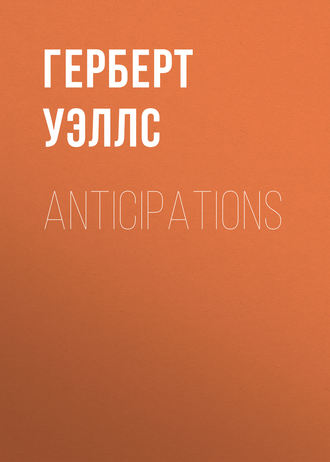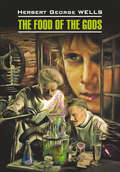
Герберт Джордж Уэллс
Anticipations
If, on the other hand, we direct attention to the antagonistic element in the machine, to Public Opinion, to the alleged collective mind of the grey mass, and consider how it is brought to believe in itself and its possession of certain opinions by the concrete evidence of daily newspapers and eloquent persons saying as much, we may also very readily conjure up a contrasted vision of extraordinary demagogues or newspaper syndicates working the political machine from that direction. So far as the demagogue goes, the increase of population, the multiplication of amusements and interests, the differentiation of social habits, the diffusion of great towns, all militate against that sufficient gathering of masses of voters in meeting-houses which gave him his power in the recent past. It is improbable that ever again will any flushed undignified man with a vast voice, a muscular face in incessant operation, collar crumpled, hair disordered, and arms in wild activity, talking, talking, talking, talking copiously out of the windows of railway carriages, talking on railway platforms, talking from hotel balconies, talking on tubs, barrels, scaffoldings, pulpits – tireless and undammable – rise to be the most powerful thing in any democratic state in the world. Continually the individual vocal demagogue dwindles, and the element of bands and buttons, the organization of the press and procession, the share of the machine, grows.
Mr. Harmsworth, of the London Daily Mail, in a very interesting article has glanced at certain possibilities of power that may vest in the owners of a great system of world-wide "simultaneous" newspapers, but he does not analyze the nature of the influence exercised by newspapers during the successive phases of the nineteenth century, nor the probable modifications of that influence in the years to come, and I think, on the whole, he inclines very naturally to over estimate the amount of intentional direction that may be given by the owner of a paper to the minds and acts of his readers, and to exceed the very definite limits within which that influence is confined. In the earlier Victorian period, the more limited, partly educated, and still very homogeneous enfranchised class, had a certain habit of thinking; its tranquil assurance upon most theological and all moral and æsthetic points left political questions as the chief field of exercise for such thinking as it did, and, as a consequence, the dignified newspapers of that time were able to discuss, and indeed were required to discuss not only specific situations but general principles. That indeed was their principal function, and it fell rather to the eloquent men to misapply these principles according to the necessity of the occasion. The papers did then very much more than they do now to mould opinion, though they did not direct affairs to anything like the extent of their modern successors. They made roads upon which events presently travelled in unexpected fashions. But the often cheaper and always more vivid newspapers that have come with the New Democracy do nothing to mould opinion. Indeed, there is no longer upon most public questions – and as I have tried to make clear in my previous paper, there is not likely to be any longer – a collective opinion to be moulded. Protectionists, for example, are a mere band, Free Traders are a mere band; on all these details we are in chaos. And these modern newspapers simply endeavour to sustain a large circulation and so merit advertisements by being as miscellaneously and vividly interesting as possible, by firing where the crowd seems thickest, by seeking perpetually and without any attempt at consistency, the greatest excitement of the greatest number. It is upon the cultivation and rapid succession of inflammatory topics that the modern newspaper expends its capital and trusts to recover its reward. Its general news sinks steadily to a subordinate position; criticism, discussion, and high responsibility pass out of journalism, and the power of the press comes more and more to be a dramatic and emotional power, the power to cry "Fire!" in the theatre, the power to give enormous value for a limited time to some personality, some event, some aspect, true or false, without any power of giving a specific direction to the forces this distortion may set going. Directly the press of to-day passes from that sort of thing to some specific proposal, some implication of principles and beliefs, directly it chooses and selects, then it passes from the miscellaneous to the sectarian, and out of touch with the grey indefiniteness of the general mind. It gives offence here, it perplexes and bores there; no more than the boss politician can the paper of great circulation afford to work consistently for any ulterior aim.
This is the limit of the power of the modern newspaper of large circulation, the newspaper that appeals to the grey element, to the average democratic man, the newspaper of the deliquescence, and if our previous conclusion that human society has ceased to be homogeneous and will presently display new masses segregating from a great confusion, holds good, that will be the limit of its power in the future. It may undergo many remarkable developments and modifications,35 but none of these tend to give it any greater political importance than it has now. And so, after all, our considerations of the probable developments of the party machine give us only negative results, so long as the grey social confusion continues. Subject to that continuance the party machine will probably continue as it is at present, and Democratic States and governments follow the lines upon which they run at the present time.
Now, how will the emergent class of capable men presently begin to modify the existing form of government in the ostensibly democratic countries and democratic monarchies? There will be very many variations and modifications of the methods of this arrival, an infinite complication of detailed incidents, but a general proposition will be found to hold good. The suppression of the party machine in the purely democratic countries and of the official choice of the rich and privileged rulers in the more monarchical ones, by capable operative and administrative men inspired by the belief in a common theory of social order, will come about – peacefully and gradually as a process of change, or violently as a revolution – but inevitably as the outcome either of the imminence or else of the disasters of war.
That all these governments of confusion will drift towards war, with a spacious impulse and a final vehemence quite out of comparison greater than the warlike impulses of former times, is a remarkable but by no means inexplicable thing. A tone of public expression, jealous and patriotic to the danger-point, is an unavoidable condition under which democratic governments exist. To be patriotically quarrelsome is imperative upon the party machines that will come to dominate the democratic countries. They will not possess detailed and definite policies and creeds because there are no longer any detailed and definite public opinions, but they will for all that require some ostensible purpose to explain their cohesion, some hold upon the common man that will ensure his appearance in numbers at the polling place sufficient to save the government from the raids of small but determined sects. That hold can be only of one sort. Without moral or religious uniformity, with material interests as involved and confused as a heap of spelicans, there remains only one generality for the politician's purpose, the ampler aspect of a man's egotism, his pride in what he imagines to be his particular kind – his patriotism. In every country amenable to democratic influences there emerges, or will emerge, a party machine, vividly and simply patriotic – and indefinite upon the score of any other possible consideration between man and man. This will hold true, not only of the ostensibly democratic states, but also of such reconstituted modern monarchies as Italy and Germany, for they, too, for all their legal difference, rest also on the grey. The party conflicts of the future will turn very largely on the discovery of the true patriot, on the suspicion that the crown or the machine in possession is in some more or less occult way traitorous, and almost all other matters of contention will be shelved and allowed to stagnate, for fear of breaking the unity of the national mechanism.
Now, patriotism is not a thing that flourishes in the void, – one needs a foreigner. A national and patriotic party is an anti-foreign party; the altar of the modern god, Democracy, will cry aloud for the stranger men. Simply to keep in power, and out of no love of mischief, the government or the party machine will have to insist upon dangers and national differences, to keep the voter to the poll by alarms, seeking ever to taint the possible nucleus of any competing organization with the scandal of external influence. The party press will play the watch-dog and allay all internal dissensions with its warning bay at some adjacent people, and the adjacent peoples, for reasons to be presently expanded, will be continually more sensitive to such baying. Already one sees country yelping at country all over the modern world, not only in the matter of warlike issues, but with a note of quite furious commercial rivalry – quite furious and, indeed, quite insane, since its ideal of trading enormously with absolutely ruined and tradeless foreigners, exporting everything and importing nothing, is obviously outside reason altogether. The inexorable doom of these governments based on the grey, is to foster enmity between people and people. Even their alliances are but sacrifices to intenser antagonisms. And the phases of the democratic sequence are simple and sure. Forced on by a relentless competition, the tone of the outcries will become fiercer and fiercer; the occasions of excitement, the perilous moments, the ingenuities of annoyance, more and more dramatic, – from the mere emptiness and disorder of the general mind! Jealousies and anti-foreign enactments, tariff manipulations and commercial embitterment, destructive, foolish, exasperating obstructions that benefit no human being, will minister to this craving without completely allaying it. Nearer, and ever nearer, the politicians of the coming times will force one another towards the verge, not because they want to go over it, not because any one wants to go over it, but because they are, by their very nature, compelled to go that way, because to go in any other direction is to break up and lose power. And, consequently, the final development of the democratic system, so far as intrinsic forces go, will be, not the rule of the boss, nor the rule of the trust, nor the rule of the newspaper; no rule, indeed, but international rivalry, international competition, international exasperation and hostility, and at last – irresistible and overwhelming – the definite establishment of the rule of that most stern and educational of all masters —War.
At this point there opens a tempting path, and along it historical precedents, like a forest of notice-boards, urge us to go. At the end of the vista poses the figure of Napoleon with "Cæsarism" written beneath it. Disregarding certain alien considerations for a time, assuming the free working out of democracy to its conclusion, we perceive that, in the case of our generalized state, the party machine, together with the nation entrusted to it, must necessarily be forced into passionate national war. But, having blundered into war, the party machine will have an air of having accomplished its destiny. A party machine or a popular government is surely as likely a thing to cause a big disorder of war and as unlikely a thing to conduct it, as the wit of man, working solely to that end, could ever have devised. I have already pointed out why we can never expect an elected government of the modern sort to be guided by any far-reaching designs, it is constructed to get office and keep office, not to do anything in office, the conditions of its survival are to keep appearances up and taxes down,36 and the care and management of army and navy is quite outside its possibilities. The military and naval professions in our typical modern State will subsist very largely upon tradition, the ostensible government will interfere with rather than direct them, and there will be no force in the entire scheme to check the corrupting influence of a long peace, to insist upon adequate exercises for the fighting organization or ensure an adequate adaptation to the new and perpetually changing possibilities of untried apparatus. Incapable but confident and energetic persons, having political influence, will have been permitted to tamper with the various arms of the service, the equipment will be largely devised to create an impression of efficiency in times of peace in the minds of the general voting public, and the really efficient soldiers will either have fretted themselves out of the army or have been driven out as political non-effectives, troublesome, innovating persons anxious to spend money upon "fads." So armed, the New Democracy will blunder into war, and the opening stage of the next great war will be the catastrophic breakdown of the formal armies, shame and disasters, and a disorder of conflict between more or less equally matched masses of stupefied, scared, and infuriated people. Just how far the thing may rise from the value of an alarming and edifying incident to a universal catastrophe, depends upon the special nature of the conflict, but it does not alter the fact that any considerable war is bound to be a bitter, appalling, highly educational and constitution-shaking experience for the modern democratic state.
Now, foreseeing this possibility, it is easy to step into the trap of the Napoleonic precedent. One hastens to foretell that either with the pressure of coming war, or in the hour of defeat, there will arise the Man. He will be strong in action, epigrammatic in manner, personally handsome and continually victorious. He will sweep aside parliaments and demagogues, carry the nation to glory, reconstruct it as an empire, and hold it together by circulating his profile and organizing further successes. He will – I gather this from chance lights upon contemporary anticipations – codify everything, rejuvenate the papacy, or, at any rate, galvanize Christianity, organize learning in meek intriguing academies of little men, and prescribe a wonderful educational system. The grateful nations will once more deify a lucky and aggressive egotism… And there the vision loses breath.
Nothing of the sort is going to happen, or, at any rate, if it happens, it will happen as an interlude, as no necessary part in the general progress of the human drama. The world is no more to be recast by chance individuals than a city is to be lit by sky rockets. The purpose of things emerges upon spacious issues, and the day of individual leaders is past. The analogies and precedents that lead one to forecast the coming of military one-man-dominions, the coming of such other parodies of Cæsar's career as that misapplied, and speedily futile chess champion, Napoleon I. contrived, are false. They are false because they ignore two correlated things; first, the steady development of a new and quite unprecedented educated class as a necessary aspect of the expansion of science and mechanism, and secondly, the absolute revolution in the art of war that science and mechanism are bringing about. This latter consideration the next chapter will expand, but here, in the interests of this discussion, we may in general terms anticipate its gist. War in the past has been a thing entirely different in its nature from what war, with the apparatus of the future, will be – it has been showy, dramatic, emotional, and restricted; war in the future will be none of these things. War in the past was a thing of days and heroisms; battles and campaigns rested in the hand of the great commander, he stood out against the sky, picturesquely on horseback, visibly controlling it all. War in the future will be a question of preparation, of long years of foresight and disciplined imagination, there will be no decisive victory, but a vast diffusion of conflict – it will depend less and less on controlling personalities and driving emotions, and more and more upon the intelligence and personal quality of a great number of skilled men. All this the next chapter will expand. And either before or after, but, at any rate, in the shadow of war, it will become apparent, perhaps even suddenly, that the whole apparatus of power in the country is in the hands of a new class of intelligent and scientifically-educated men. They will probably, under the development of warlike stresses, be discovered – they will discover themselves – almost surprisingly with roads and railways, carts and cities, drains, food supply, electrical supply, and water supply, and with guns and such implements of destruction and intimidation as men scarcely dream of yet, gathered in their hands. And they will be discovered, too, with a growing common consciousness of themselves as distinguished from the grey confusion, a common purpose and implication that the fearless analysis of science is already bringing to light. They will find themselves with bloodshed and horrible disasters ahead, and the material apparatus of control entirely within their power. "Suppose, after all," they will say, "we ignore these very eloquent and showy governing persons above, and this very confused and ineffectual multitude below. Suppose now we put on the brakes and try something a little more stable and orderly. These people in possession have, of course, all sorts of established rights and prescriptions; they have squared the law to their purpose, and the constitution does not know us; they can get at the judges, they can get at the newspapers, they can do all sorts of things except avoid a smash – but, for our part, we have these really most ingenious and subtle guns. Suppose instead of our turning them and our valuable selves in a fool's quarrel against the ingenious and subtle guns of other men akin to ourselves, we use them in the cause of the higher sanity, and clear that jabbering war tumult out of the streets."… There may be no dramatic moment for the expression of this idea, no moment when the new Cromwellism and the new Ironsides will come visibly face to face with talk and baubles, flags and patriotic dinner bells; but, with or without dramatic moments, the idea will be expressed and acted upon. It will be made quite evident then, what is now indeed only a pious opinion, namely, that wealth is, after all, no ultimate Power at all, but only an influence among aimless, police-guarded men. So long as there is peace the class of capable men may be mitigated and gagged and controlled, and the ostensible present order may flourish still in the hands of that other class of men which deals with the appearances of things. But as some supersaturated solution will crystallize out with the mere shaking of its beaker, so must the new order of men come into visibly organized existence through the concussions of war. The charlatans can escape everything except war, but to the cant and violence of nationality, to the sustaining force of international hostility, they are ruthlessly compelled to cling, and what is now their chief support must become at last their destruction. And so it is I infer that, whether violently as a revolution or quietly and slowly, this grey confusion that is Democracy must pass away inevitably by its own inherent conditions, as the twilight passes, as the embryonic confusion of the cocoon creature passes, into the higher stage, into the higher organism, the world-state of the coming years.







